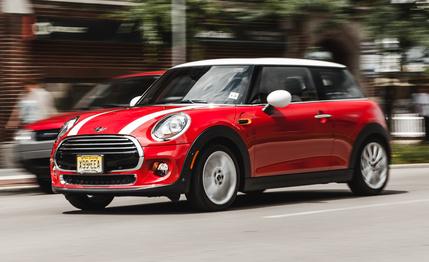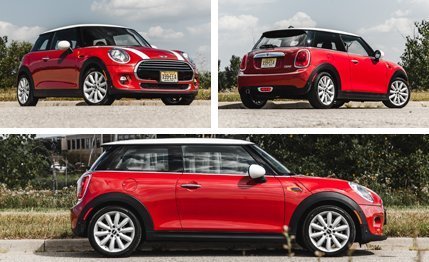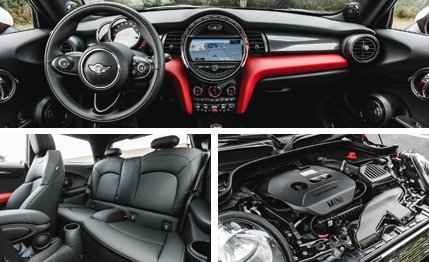 Instrumented Test
Instrumented Test
Under BMW’s stewardship, the Mini Cooper has been a rambunctious ball of hanky-panky, all stiff ride, manic responses, and general churlishness. Alas, the blouses are being rebuttoned and the flies re-zipped, for—like a parent interrupting a teen groping session—BMW is tossing some cold water on its spry British hatchback.
It starts with forcing the Mini onto BMW’s new, larger front-drive platform. BMW’s compact UKL structure won’t go any smaller, meaning the base Cooper tested here, relative to its predecessor, is saddled with a 209-pound ball and chain plus a larger footprint. As it does in the 189-hp Cooper S, the enlargement dulls the car’s responses and calms the ride. That the S model shrugs off the chub when accelerating is expected; that this less-powerful Cooper does the same is not.
 Powered by a turbocharged three-cylinder, this bigger, heavier Mini Cooper is almost as quick as the first-generation Mini Cooper S.
Powered by a turbocharged three-cylinder, this bigger, heavier Mini Cooper is almost as quick as the first-generation Mini Cooper S.
Credit the spunky turbocharged 1.5-liter three-cylinder from BMW’s new small-engine family. Up 16 horsepower and 48 pound-feet of torque on the old Cooper’s 1.6-liter four—for totals of 134 ponies at 6000 rpm and 162 pound-feet at 1250—the triple doesn’t much notice the Cooper’s recent Bavarian spaetzle binge. We hit 60 mph in 7.3 seconds, 0.4 second quicker than in the outgoing model and nearly as expediently as the first-gen supercharged Cooper S.
The engine’s slender power band sits low in the rev range and is yoked to gearing taller than a skyscraper (at 100 mph in sixth, the tach reads just over 3000 rpm). So, the motor is markedly calm on the highway. Diligent shifting is required for maximum haste. Yet even when fully wound out, the three-pot remains baby-bottom smooth and emits only a pleasing gurgling sound and subtle turbo whistle. We recorded an average of 32 mpg—2 more than the old Cooper.

Though the interior is now covered in quality soft plastics and a BMW-derived display replaces the old car’s silly central speedometer, rebelliousness still abounds. The air-conditioning vents are buried behind the steering-wheel rim. The iDrive-like knob is buried between the front seats. And the headlight controls are buried under the dashboard. Similarly, front passengers sit curiously far back and low, allowing a rear-legroom gain of just 2.9 inches, or enough to finally accommodate the legs of ventriloquist dummies. And there’s little whimsy in the driver’s view forward, which is all distant gun-slit windshield and thick A-pillars.
Given how little “Mini” survives in this base Cooper’s chassis, the calamitous ergonomics are an apropos way of connecting the new Cooper to earlier versions. And the car’s newfound gentility and charming three-cylinder are mere bonuses for the devotees of quasi-Brit style and hilarious interiors. Parents with teenagers should love it, since zero under-the-shirt shenanigans could be attempted in the back seat. For the insatiably randy, Mini now offers the roomier 4 Door, which is even less mini.